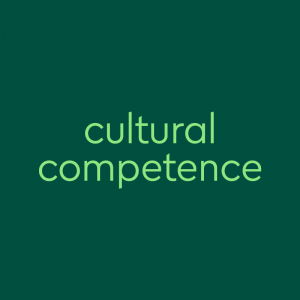Historical & Current Events dictionary
cultural competence
[ kuhl-cher-uhl kom-pi-tuhns ]
What does cultural competence mean?
Cultural competence is the ability to effectively interact with people from cultures different from one’s own, especially through a knowledge and appreciation of cultural differences.
In general, competence means the quality of possessing the necessary skill or knowledge to handle a particular situation or task.
In cultural competence, this means having the knowledge and tact to understand people and treat them equitably despite cultural differences (which often result in very different views about what is expected or appropriate in a particular situation).
Cultural competence is often used in the context of medicine, in discussions about improving medical care for patients of all cultures. For example, knowing that some patients’ religious practices may prevent them from attending appointments at certain times may help a health care provider to provide better care by offering more flexible appointment times or other accommodations.
The term is also becoming more well-known in other contexts, such as in discussions of how to make workplaces more equitable and inclusive.
The adjective culturally competent is used to describe a person who has cultural competence or actions that demonstrate cultural competence.
Example: Any hospital that wants to improve patient outcomes should be training its staff in cultural competence.
Where does cultural competence come from?

The term cultural competence was first introduced in a 1989 paper by mental health researchers Terry L. Cross, Barbara J. Bazron, Karl W. Dennis, and Mareasa R. Isaacs. The paper focused on the treatment of children and how cultural differences can lead to inequitable care when medical organizations and staff are not culturally competent.
Since then, cultural competence training has become more common in medicine and other organizations that specialize in health and human services, such as government agencies.
Many medical organizations and research recognizes cultural competence as key to ensuring that all patients receive equitable care. This is supported by data showing significant disparities in medical care availability and treatment based on cultural differences, even when economic factors such as patient income and health insurance are accounted for.
Examples of cultural competence
Who uses cultural competence?
Cultural competence is associated with the field of medicine, but awareness and use of the term and concept has spread to other fields.
If you want to develop an effective #mentoring program centered on the community that you intend to serve, you must include ongoing training in cultural competence. We all come from different walks of life and we view and respond to challenges in unique ways. #MentoringMonth
— Arnaldo Díaz Vázquez, PhD (@ADiaz_PhD) January 4, 2021
Q7: Becoming globally and culturally competent is a lifelong process. What is one thing you are currently doing/plan to do to continue on your path toward global and cultural competence? #globaledchat #IEW2019
— Peace Corps (@PeaceCorps) November 22, 2019
I grew up in Georgia. If SEC football required proof of #COVID19 #vaccine to attend games & had some ticket giveaways for the fully vaccinated, you’d get young southerners vaccinated. This is southern cultural competence.
— Tatiana Prowell, MD (@tmprowell) May 6, 2021
Note
This is not meant to be a formal definition of cultural competence like most terms we define on Dictionary.com, but is rather an informal word summary that hopefully touches upon the key aspects of the meaning and usage of cultural competence that will help our users expand their word mastery.